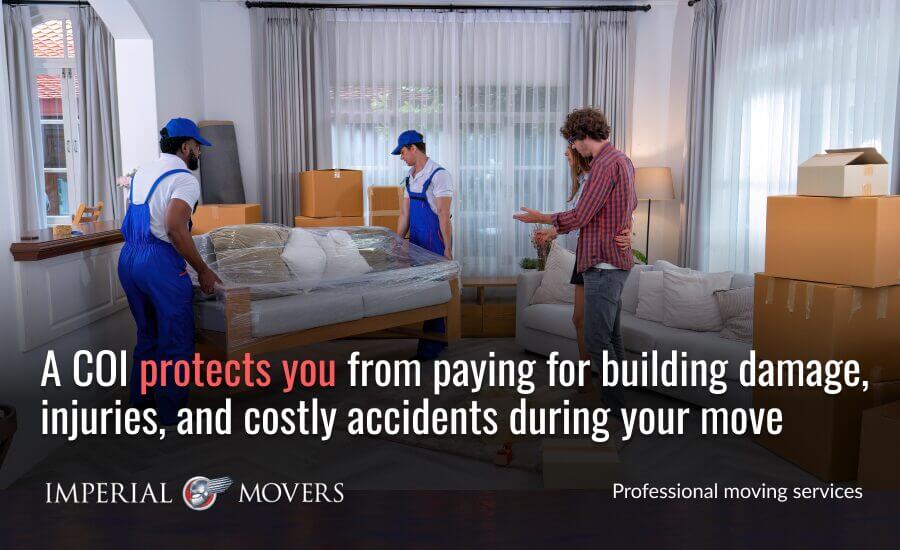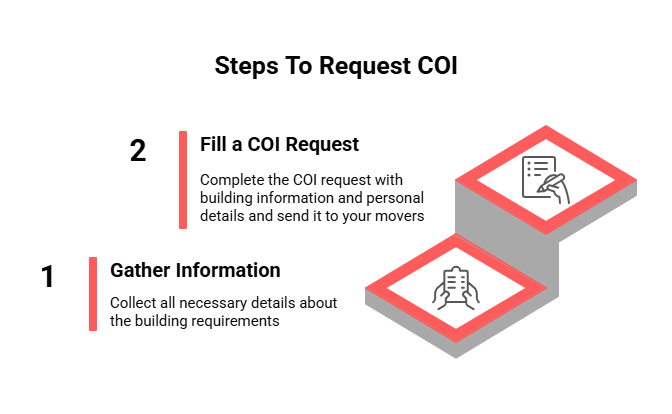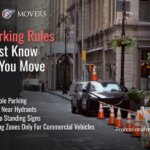COI Movers in NYC: Key Takeaways
- Hiring Certificate of Insurance (COI) movers protects you from costly damage bills and speeds up move-in scheduling
- A COI proves your movers are insured and covers building damage like scratched walls, dented elevators, or marked floors
- Buildings require COIs to protect themselves from liability and prevent DOB violations
- If your building requires a COI, fill out a COI request form and let your movers handle the rest
- If safety rules are broken during a move, both you and your building can be tied to DOB violations
- Violations can delay or block your move if elevators are shut down, permits are missing, or safety hazards exist
Picture this: you’re relocating into a high-rise apartment, and while maneuvering your sofa, your movers scrape the lobby wall.
A week later, the building sends you a repair bill for $2,000: your movers didn’t have a COI and the damage isn’t covered by insurance. You know now that the “cheap” moving deal you were so proud of is likely to become one of the most expensive moving mistakes you’ve made.
We’ll break down:
- Why it’s important to work with COI movers in NYC
- What a Certificate of Insurance is and what it covers
- Why property managers require movers to have a COI
- How to get a COI for your move
- What DOB violations are and how they can impact your relocation
- What to do if a violation occurs before or during your move
Need a Certificate of Insurance for your move? Imperial Movers will help
Why It’s Important To Work With COI Movers in NYC
In NYC, a single dent in a lobby wall can trigger a hefty bill. Unless your movers have the right insurance in place.
Working with COI-compliant movers ensures:
- Guaranteed building access without awkward standoffs in the lobby
- Your wallet stays safe from surprise repair invoices
- Elevator bookings get approved faster when your paperwork’s ready
- Peace of mind that any accident or injury will be compensated by the mover’s insurance company
- Higher moving standards, as COI movers are more likely to know NYC’s unique moving challenges
Certificate of Insurance for Moving Explained
A Certificate of Insurance (COI) is an official document given to your moving company by their insurance provider to prove they carry the liability and coverage to perform your move.
A mandatory condition by many NYC residential and commercial buildings, which may refuse entry without a pre-approved COI, it protects you, your building, and your neighbors from accidental injury and damage.
For instance, if a dresser chips the elevator door or a moving cart leaves marks on the hallway floor, the COI will cover for the damage.
What Does a Certificate of Insurance Cover?
A COI typically includes:
- General liability coverage, so if a cart leaves a wheel-shaped dent in the lobby wall, you’re not paying to fix it.
- Worker’s compensation, in case a mover sprains an ankle while moving your apartment.
- Automobile liability, meaning you won’t have to pay if the truck’s side mirror takes down a fence or scrapes the curbside awning.
- Extra protection above policy limits in unusual situations: think restoring a marble lobby in a historic building, covering several damages from one mishap, or handling “domino effect” accidents where one mistake leads to another.

From lobby scratches to rare high-cost mishaps, a COI ensures the mover’s insurance covers the bill
Why Property Managers Require COI
Without a Certificate of Insurance, buildings may be held directly liable to third-party claims arising during the move.
That’s why property management reviews COIs carefully to verify that tenants hire insured COI movers to handle all logistics.
A key requirement is having the names of the building and property management as ‘certificate holders’ or ‘additional insured.’
Moving in NYC without a valid COI can violate fire code or building access rules. These oversights contribute to NY DOB violations that could lead to fines or future permit delays.
To prevent issues, property managers typically:
- Publish COI requirements in tenant handbooks.
- Establish clear approval workflows.
- Maintain digital logs to prove compliance in case of audits or inspections.
How To Get a Certificate of Insurance for Moving in NYC
- Ask your building manager about the COI requirements, including exact wording and coverage limits.
- Fill out a COI request, adding:
- The building’s details: city, address, contact name, and phone number
- Your personal information: name, moving date, phone number, and email.
A licensed mover will then request the COI from their insurer and email it to the building’s management for approval, taking care to have everything ready before your moving date.

Starting your COI request early ensures your building approves it well before moving day
Understanding NYC DOB Violations When Moving
During a move in NYC, both the building and the person moving can end up tied to a Department of Buildings (DOB) violation.
Violations Issued to the Building
Being responsible for the property’s compliance with NYC building codes, the building owner or management may be given a violation due to:
- Blocked egress, if movers have left furniture or boxes in front of emergency exits.
- Improper use of freight or passenger elevators, breaking DOB safety rules.
- Unsafe conditions like loose scaffolding or damaged stairs that can put tenants’ health at risk.
Violations That Can Impact You
While the DOB generally issues violations to the property owner, you could face consequences if:
- The building charges you repair costs under your lease agreement.
- You used unlicensed, uninsured movers who caused damage leading to a violation.
- You ignored building protocols that caused the violation, for example, removing a fire door to move a sofa in or out.
How Can DOB Violations Affect Your Move?
Even when DOB violations aren’t your fault, they can delay your move. For example:
- If an elevator is shut down due to a failed inspection, you may be forced to carry all your heavy furniture up or down the stairs or reschedule.
- If a renovation doesn’t have a proper permit, this can stop work, blocking access to certain areas.
- Fire safety violations can restrict your move if the emergency exits are blocked or unsafe.
- Unsafe building conditions like loose bricks or unstable staircases can stop your move for safety reasons.
What To Do If You Receive a DOB Violation During Your Move
- Contact building management to check if the violation will affect your move schedule.
- Check the NYC DOB website for the violation’s status and details.
- Reschedule or adjust logistics based on the situation (for example, if the DOB inspectors have shut down the elevator).
- Keep copies of building notices and DOB reports in case you need to negotiate move-related fees or rescheduling charges.
Need a COI for Your Move? Imperial Has You Covered
Knowing NYC in and out after hundreds of complex relocations, including heavy furniture, expensive pianos, difficult-to-handle pool tables, and rare art, Imperial Movers is here to help you with your Certificate of Insurance.
We know COI is more than a document; you could call it your ticket to your new home on the move day.
Fully licensed and insured, we meet all NYC coverage requirements of NYC residential and commercial moves.
Need a COI?
Fill out the COI request form on our website and leave the rest to us. We’ll work directly with your building’s management to ensure every box is checked before move day.
All of it, without extra fees, as COI preparation is part of our moving service.
Hate dealing with COI paperwork? Imperial Movers takes care of it start to finish
COI Movers in NYC: FAQs
How much does it cost to get a COI?
Getting a COI with Imperial Movers is free, as it’s part of the moving package we offer. However, some moving companies may charge a processing fee, so make sure to ask if it’s included in the service.
How early should I request a COI when moving?
Request a Certificate of Insurance at least three to five business days before your move. This will give your movers enough time to call their insurance provider and submit the COI to your building management.
Can I move without a COI in NYC?
Technically, yes, but in most NYC buildings? Not a chance. And even if they don’t ask for one, skipping it is like driving without car insurance. A COI offers peace of mind, keeping you financially protected in case of damage.
What happens if my movers don’t have a COI?
If your movers don’t have a COI and it’s required, you may be denied access to the building or be held personally liable for any damage caused during the move. In NYC, that can mean thousands of dollars in repairs.
Who typically handles the COI: me or the moving company?
Your movers typically handle the COI request with their insurance provider, but you need to provide your building’s requirements and contact details so it’s prepared correctly.
Building won’t let you move without a COI? Imperial will get it ready before your moving day




